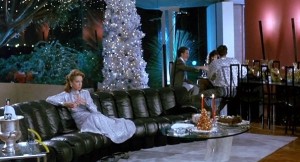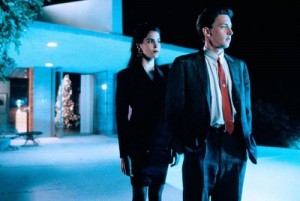One of the best films of Robert Aldrich’s middle period (1966). Aldrich takes a fairly standard adventure-plot departure pointa plane crash in the desert, and the survivors struggle to rebuild itand has a field day with all the character tensions that ensue. The movie is unusually long (147 minutes), but it keeps moving and stays suspenseful thanks to an able all-star cast: James Stewart, Richard Attenborough, Peter Finch, Hardy Kruger, Ernest Borgnine, Ian Bannen, Ronald Fraser, Christian Marquand, Dan Duryea, and George Kennedy. (JR) Read more
A 1937 British thriller involving a family of counterfeiters in an Austrian mountain resort, this rare feature was directed by Bernard Vorhaus, a visual stylist whose handling of conventional genre material in the U.S. and England has made him the focus of several retrospectives in Europe. Starring Jane Baxter, Ronald Squire, and Margaret Rutherford, the film features impressive mountain scenery and some exciting cliff-hangers. (JR) Read more
Richard Attenborough’s epic 1987 account of South African journalist Donald Woods (Kevin Kline) and his friendship with black activist and martyr Steve Biko (Denzel Washington) infuriatingly devotes most of its 158 minutes to the former rather than the latter, and what begins as a stirring mainstream account of the meaning of Biko’s politics and legacy eventually becomes a protracted tale of Woods and his family’s escape from South Africa, in order that he might tell the truth about Biko’s death at the hands of the police. Giving Biko the Gandhi treatment may have its educational uses, and the first half of the film builds up an effective sense of outrage about apartheid in general and the persecution of Biko in particular. But turning this story into yet another version of the nobility of the White Man’s Burden effectively undercuts the radical importance of Biko’s movement for the sake of flattering the liberal white audience’s sympathies; the results are watchable, but ultimately specious. With Penelope Wilton as Woods’s wife; screenplay by John Briley, adapted from Woods’s books Biko and Asking for Trouble. (JR) Read more
It’s rare that two actors are expected to carry an entire picture, but this winsome lark with Martin Short and Annette O’Toole is predicated on just that, and succeeds delightfully. The encounter is both archetypal and very contemporary: it’s their third date, each of them has high hopes, and both have things to conceal from each other. Armyan Bernstein, who wrote One From the Heart, collaborated on the script with Gail Parent and directed, and Lawrence Kasdan, of all people, produced, but it’s Short and O’Toole who carry the show throughout; all but a few of the movie’s 96 minutes are devoted to the date, and they keep it fresh, sexy, and unpredictable. It’s a nice demonstration that the most overworked of comic formulas can still work if sparked with the right insights and personalities. (JR) Read more
A first feature by former French journalist Stephanie de Mareuil, Coeurs croises follows the amorous tribulations of a group of women living in the same apartment house in rue Saint-Denis, the major prostitute district of Paris. This sentimental and partially comic new film ends with actress-singer Caroline Loeb’s hit song, C’est la ouate. (JR) Read more
Shirley Temple is rescued from a shipwreck by lighthouse keeper Guy Kibbee, but the nasty forces of the law want to separate her from her newly found guardian. David Butler directed, and Temple and Buddy Ebsen dance At the Codfish Ball (1936). Read more
Elsa Lanchester plays an uptight missionary trying to reform a beach bum (Charles Laughton) in this 1938 romantic comedy directed by Erich Pommer, adapted from W. Somerset Maugham’s short story The Vessel of Wrath. Not to be confused with Muriel Box’s inferior 1954 remake with Glynis Johns and Robert Newton in the leading roles, this is reportedly the best of all the Laughton/Lanchester collaborations, and in some respects a precursor of The African Queen. On the same program, a rare, silent shortone of a series of three made by British film writer Ivor Montagu in 1928Bluebottles is a slapstick comedy written specifically for Elsa Lanchester, with Laughton in a small role as a gangster. Read more
From the Chicago Reader (November 1, 1987). — J.R.

Reefer Madness comes to Beverly Hills in the affluent 80s. Perhaps not since Midnight Express had we gotten so much sanctimony and glitz simultaneously; while the earlier film worked up a righteous indignation about the conditions of Turkish prisons — not for Turks but for well-bred Americans — this 1987 movie reserves all its pity about the ravages of cocaine burnout for the children of multimillionaires. Adapted by Harley Peyton from Bret Easton Ellis’s novel, the story focuses on three high school graduates — an upright college kid (Andrew McCarthy), his former girlfriend (Jami Gertz) who now works as a model and dabbles in coke, and a would-be record producer and disco manager who’s fatally hooked on the stuff (Robert Downey Jr.) and follows their tribulations through the Christmas holidays. Marek Kanievska (Another Country) directs with relentlessly fancy visuals in a series of opulent southern California settings; Ed Lachman’s cinematography is letter perfect as always in its handling of light and color (assisted here by Barbara Ling’s flashy production design), but it’s a pity to see it wasted on such claptrap. (JR)
 Read more
Read more


